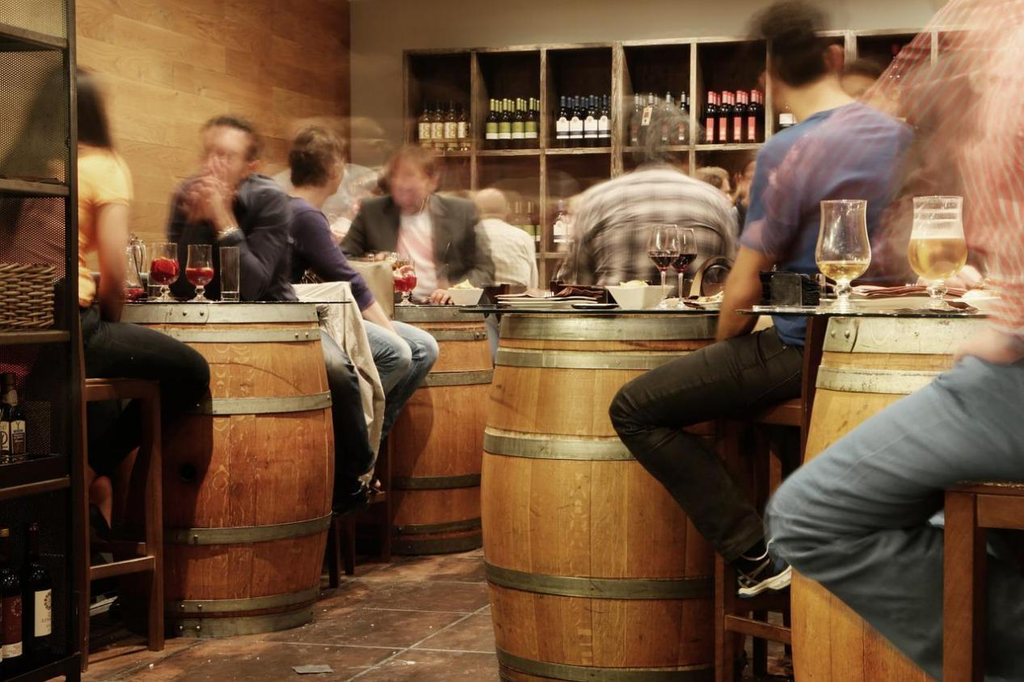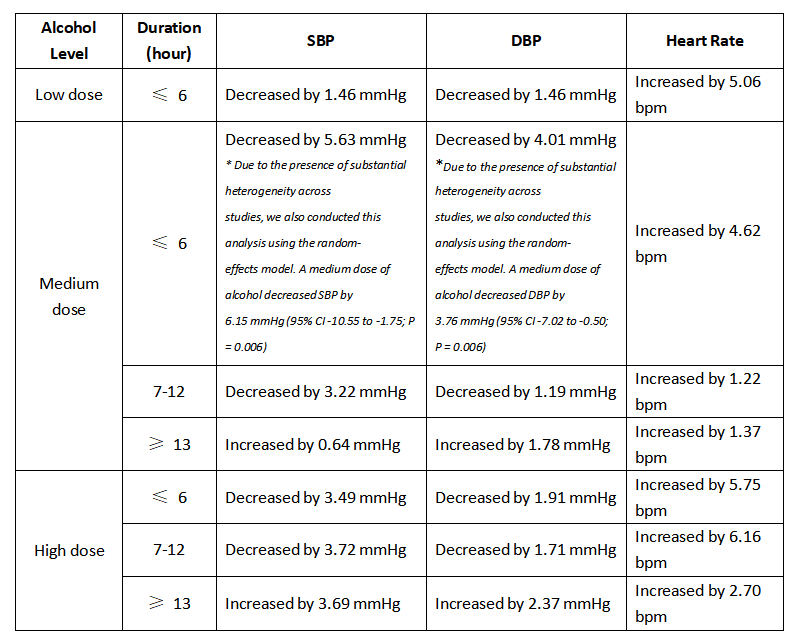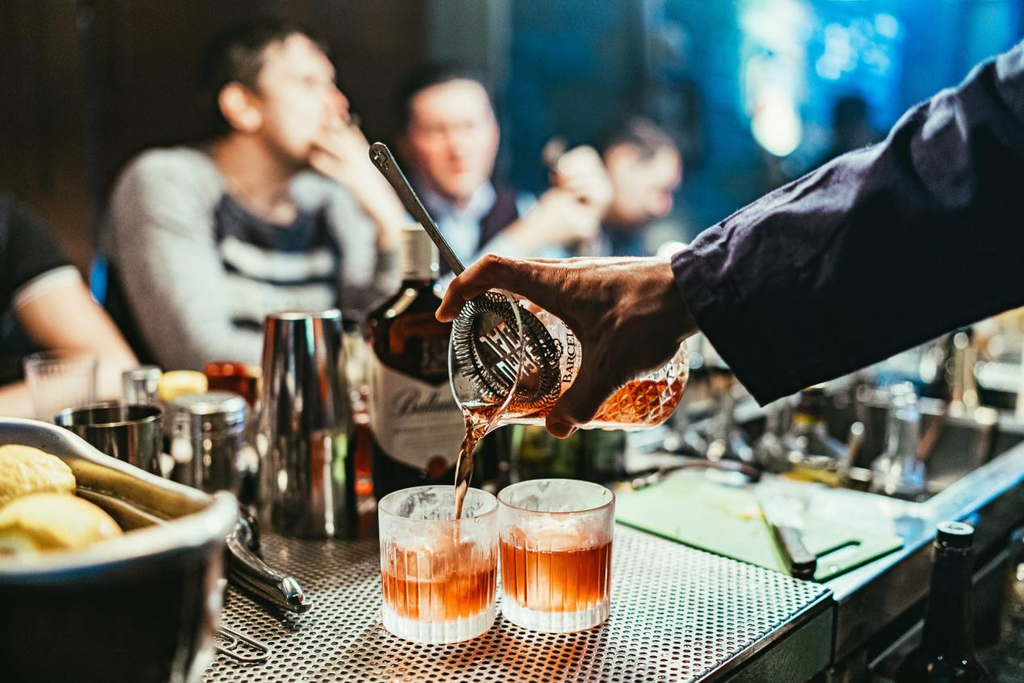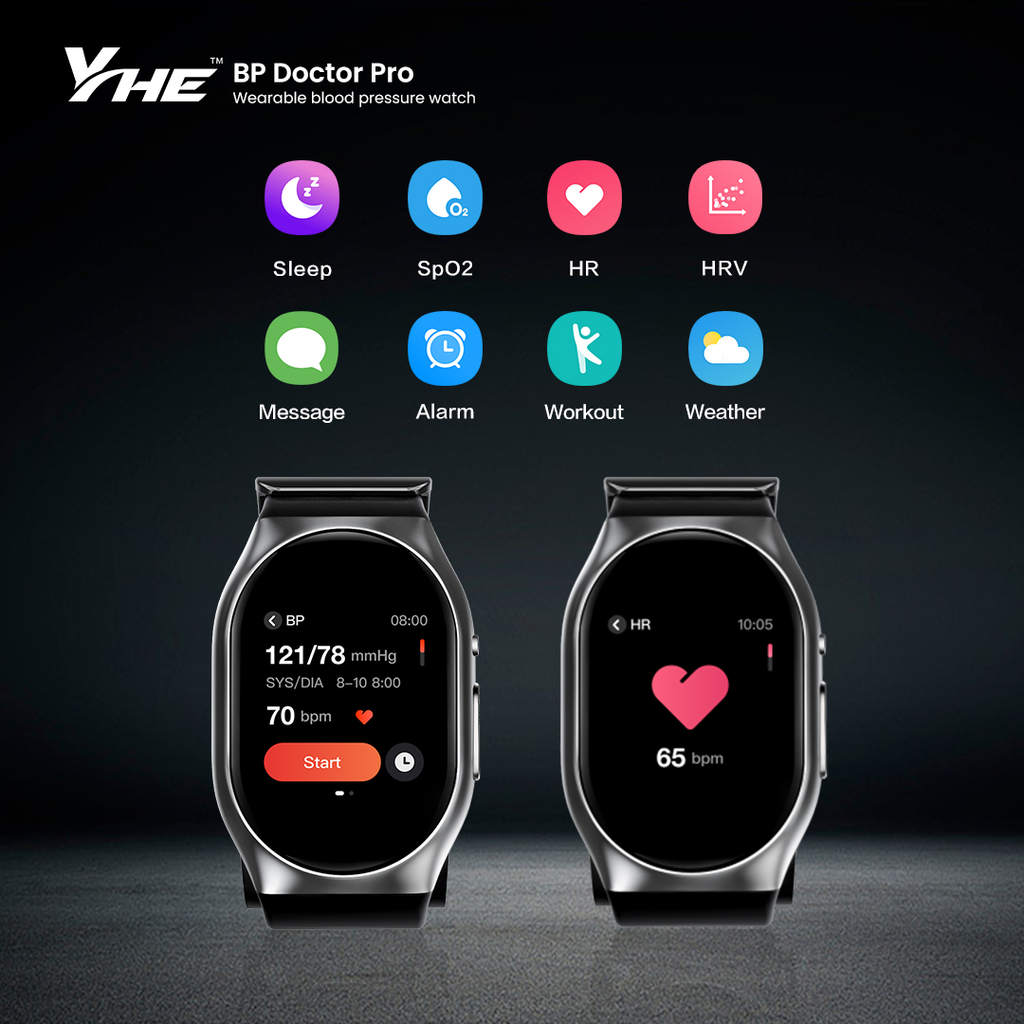Hypertension has become the most important risk factor for cardiovascular events and cardiovascular death worldwide [1]. Identifying and controlling potential risk factors for hypertension is of great significance to reduce the burden of disease. There are many risk factors that affect high blood pressure, and alcohol is one of them. Alcohol and drinking culture have existed for a long time in human history. According to the World Health Organization (WHO), around 2.3 billion people around the world drink alcohol, most of them in Europe. Drinkers consumed an average of 32.8 grams of pure alcohol per day, with beer (34.3%) being the most consumed alcoholic beverage [2].
Now let’s read on to understand the relationship between alcohol consumption and high blood pressure.
How does alcohol impact blood pressure?
Alcohol can directly or indirectly increase the risk of high blood pressure in a number of ways, and these effects are often related to how alcohol is processed in the body. Alcohol can raise blood pressure by:
- Renin-angiotensin-aldosterone system
The renin-angiotensin-aldosterone system (RAAS) plays an important role in regulating blood pressure and water-electrolyte balance, and maintaining the relative stability of the human body environment. The renin-angiotensin-aldosterone system is an important mechanism involved in the pathogenesis of hypertension. Excessive activation of the angiotensin-aldosterone system in the kidney is one of the reasons for the formation of hypertension.
Alcohol elevates the blood levels of the renin compound, which results in the blood vessels constricting, making them smaller in diameter. An increase in the renin hormone also decreases how much fluid the body eliminates as urine, raising fluid levels within the body. The combination of smaller blood vessels and more fluids increases the chances of hypertension.
- Vasopressin levels
Antidiuretic hormone (ADH), also known as vasopressin, is a hormone responsible for the body's ability to retain water, usually limiting the amount of urine the kidneys produce. Vasopressin is suppressed when people drink alcohol. As a result, the body overcompensates by releasing more vasopressin, causing blood pressure to rise.

- Cortisol levels
Cortisol is the primary hormone of stress and plays an important role in regulating inflammation, immune function, and metabolism. However, prolonged intake of too much cortisol is associated with increased blood pressure [3]. The study found that plasma cortisol levels increased significantly after drinking alcohol, while plasma cortisol levels decreased significantly when stopping alcohol consumption [4]. As a result, alcohol causes cortisol levels to rise, which can cause cardiovascular changes that may ultimately lead to increased blood pressure.
- Blood calcium levels
The consumption of alcohol is known to increase the amount of calcium that tends to get bound to the arterial and arteriolar smooth muscle cells. This leads to an increased sensitivity of blood vessels to compounds that constrict them. The constriction of blood vessels means that the heart has to pump harder, which results in increased blood pressure.
Effects of alcohol on blood pressure
Studies have found that light-to-moderate alcohol consumption can lower blood pressure for up to 12 hours, but long-term alcohol intake in moderate and high doses can lead to persistent increases in blood pressure. A 2020 literature review published in the Cochrane Database of Systematic Reviews quantified the acute effects of different doses of alcohol on blood pressure and heart rate in an adult population over time by two review authors independently extracting and analyzing large database data [5]. The study divided alcohol intake into low dose, medium dose and high dose, and the different intake levels were defined as:
- Low dose (≤ 14 g of alcohol/≤ 1 standard drink).
-
Medium dose (
-
> 14 g and ≤ 30 g of alcohol for men and > 14 g and ≤ 20 g of alcohol for women).
- High dose (> 30 g of alcohol for men and > 20 g of alcohol for women).

This systematic review provides us with a better understanding of the effects of alcohol on blood pressure and heart rate: Light to moderate alcohol consumption reduces blood pressure for up to 12 hours, but high doses of alcohol increase blood pressure after 13 hours and could lead to increased blood pressure the day after consumption. Therefore, regular consumption of high-dose alcohol can lead to a sustained increase in blood pressure and the adverse outcomes associated with hypertension.

The degree to which alcohol affects blood pressure and heart rate may vary depending on genetic factors and alcohol consumption. Several long-term observational studies have also reported that light to moderate alcohol consumption is associated with a reduction in adverse cardiovascular time [6]. But at present, the explanation for the possible beneficial effects of regular light to moderate drinking is unclear. One possible explanation is:
In 2013, researchers Barden et al. found that acute alcohol consumption reduces 20-HETE (20-hydroxyeicosatetraenoic acid). 20-HETE is a signaling molecule with broad effects on the cardiovascular system. It is a vasoconstrictor that inhibits sodium reabsorption in proximal and distal renal tubules. The greatest reduction in 20-HETE occurs when blood alcohol levels are highest [7]. Acute alcohol consumption may also increase nitric oxide (NO). Nitric oxide is released from the endothelium and is a potent vasodilator. There is also an inverse relationship between NO and 20-HETE. In addition, acetaldehyde, a byproduct of alcohol metabolism, is another known vasodilator. Taken together, the decrease in vasoconstrictors and the increase in vasodilators may be responsible for the drop in blood pressure, which persisted for approximately 12 hours.
Guidelines for drinking alcohol if you have blood pressure
issues
For people with high blood pressure or those at potential risk of blood pressure, it is best not to drink alcohol, or to drink alcohol in moderation. The most important thing is to avoid excessive drinking (binge and binge drinking).
According to the CDC's definition, excessive drinking can be divided into binge drinking and heavy drinking:
- Binge drinking: the most common form of excessive drinking
- For women, 4 or more drinks at a time
- For men, 5 or more drinks at a time
- Binge drinking: the most common form of excessive drinking
- For women, 4 or more drinks at a time
- For men, 5 or more drinks at a time
- Heavy drinking:
- For women, 8 or more drinks per week
- For men, 15 or more drinks per week

To reduce the risk of alcohol-related harms, the 2020-2025 Dietary Guidelines for Americans recommends that adults of legal drinking age can choose not to drink, or to drink in moderation by limiting intake to 2 drinks or less in a day for men or 1 drink or less in a day for women, on days when alcohol is consumed. The Guidelines also do not recommend that individuals who do not drink alcohol start drinking for any reason and that if adults of legal drinking age choose to drink alcoholic beverages, drinking less is better for health than drinking more.
Although the wine is good, don't be greedy.
Don't forget to take care of your health when you drink. YHE BP Doctor Pro is dedicating in monitoring your overall health condition. As a blood pressure smartwatch, it is highly portable, accurate, and goes the extra mile by offering fitness and health features such as continuous Heart Rate Monitoring, Blood Oxygen Saturation, Sleep tracking and analysis of the sleep cycles as well as activities tracking. For those who have high blood pressure or are at risk of developing it, BP Doctor Pro is certainly a device to consider if you want to be able to check blood pressure while on the Go.

References:
1.Mancia G. Blood pressure reduction and cardiovascular outcomes: past, present, and future. Am J Cardiol 2007; 100:3J–9J.
2.World Health Organization. Global Status Report on Alcohol and Health 2018. Geneva, Switzerland: World Health Organization, 2018.
3.Husain K, Ansari RA, Ferder L. Alcohol-induced hypertension: mechanism and prevention. World Journal of Cardiology 2014;6(5):245-52.
4.Potter JF, Watson RD, Skan W, Beevers DG. The pressor and metabolic effects of alcohol in normotensive subjects. Hypertension 1986; 8: 625-631 [PMID: 3522422 DOI: 10.1161/01. HYP.8.7.625]
5.Tasnim S, Tang C, Musini VM, Wright JM. Effect of alcohol on blood pressure. Cochrane Database Syst Rev. 2020 Jul 1;7(7):CD012787. doi: 10.1002/14651858.CD012787.pub2. PMID: 32609894; PMCID: PMC8130994.
6.Briasoulis A, Agarwal V, Messerli FH. Alcohol consumption and the risk of hypertension in men and women: a systematic review and meta-analysis. Journal of Clinical Hypertension 2012;14(11):792-8.
Barden AE, CroQ KD, Beilin LJ, Phillips M, Ledowski T, Puddey IB. Acute effects of red wine on cytochrome P450 eicosanoids and blood pressure in men. Journal of Hypertension 2013;31:2195-202.
